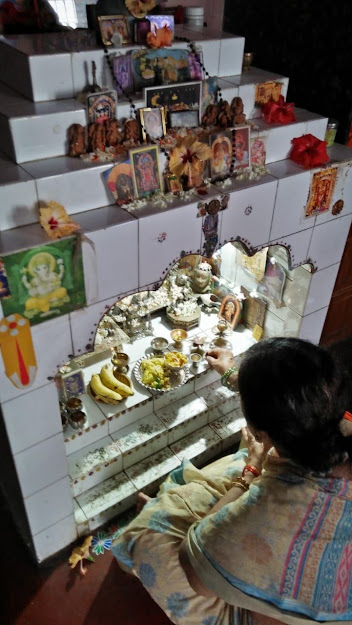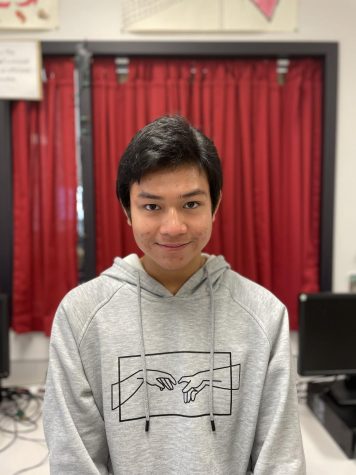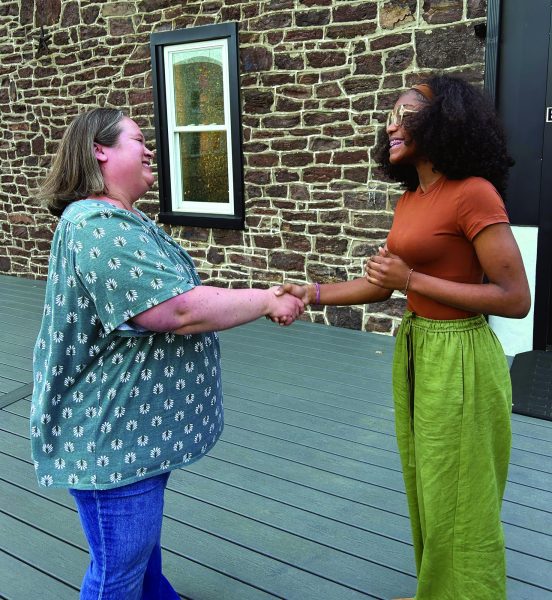Students, faculty embrace multiple holiday celebrations
Many people celebrate major holidays like Thanksgiving or Christmas, but some celebrate other holidays because of their cultural background. From Diwali to Eid-Al Fitr, Lunar New Year and Hanukkah, these are a few different religious holidays that are celebrated every year by faculty, students and their families.
Photo by Sanjeeva Rao Bhaganagarapu
In celebration of Diwali…Offering food, freshman Anuhya Vemagiri’s grandmother Madhubala Bhaganagarapu kneels before the altar that has many Hindu gods on it.
By celebrating alternative holidays, many students and teachers with different cultural backgrounds embrace their own unique holidays during the winter season, including Diwali, Eid- Al- Fitr and Lunar New Year.
According to junior Mahreen Parvez, there is a deeper meaning to the Islamic holiday, Eid Al-Fitr, that her family celebrates. It is about the praying and the people’s connection to God that make the Islamic holiday special and hold a different meaning.
“There’s more merit behind it besides, ‘Oh, it’s that time of year again,’” Parvez said. “It’s not saying that those other holidays aren’t important. I’m sure they very much are, but for us this is important.”
The Islamic holiday is important to her because it is something that she could call for her own and it is something that made her proud to talk about. Growing up, Parvez never celebrated Christmas, so she would sometimes feel left out when everyone started talking about it.
“I never celebrated Christmas, and growing up when you see all these kids [saying] ‘What are you getting for Christmas?’ and you’re just standing there like, ‘Well, I don’t celebrate Christmas’,” Parvez said.
Parvez and her family celebrated the holiday of Eid Al-Fitr, which celebrates the end of Ramadan.
Parvez said Ramadan is a month of fasting that Muslims do in order to cleanse and purify themselves to get a closer connection to God.
It is also a time of remembrance and experience of what life is like for those who are not as blessed, which is why they fast for 30 days without drinking or eating.
Eid Al-Fitr is about celebrating the fact that they have fasted by having a family get-together at the end of Ramadan.
“It’s usually just a celebration getting together [with] family and [eating] lots of food, exchanging presents and all this stuff,” Parvez said, “and it’s really fun.”
According to freshman Anuhya Vemagiri, the Indian holiday Diwali celebrates Hindu tradition.
Vemagiri said the people are very “religious” and “passionate” in India when it comes to this type of holiday.
They would pray to the gods on that day, have religious ceremonies for it, and go to the temple.
Diwali is a celebration of the returning of the god Rom after being sent away for 14 years.
To celebrate it, her family would dress up in Indian attire and they would make Indian-based food and sweets.
“You can make whatever you want, there isn’t really a specific food,” Vemagiri said.
On many other holidays, it is a key point for you to eat a certain type of food as a way to wish luck.
According to Chinese teacher Xia Pomposi, eating fish is a good sign of luck.
“Fish in Chinese means yú [which] means that’s everything you have left. And then that means that the money, good luck, everything like you always has savings, something in your family,” Pomposi said. “That’s why we’re eating the fish.”
Lunar New Year is another name for the Chinese New Year, which is a 15-day long holiday that marks the start of the new year according to the Lunar calendar.
Pomposi said the Lunar New Year is special because it is a representation of China and Chinese culture since only a few Asian countries celebrate it.
According to sophomore Aaron Miller, a way he and his family celebrate Rosh Hashanah, the Jewish New Year, is dipping apples in honey as a symbol of hope for a sweet new year.
“We have apples and we dip them in honey and the honey represents a sweet new year,” Miller said.
It is a day for people to get together to wish each other a healthy year.






